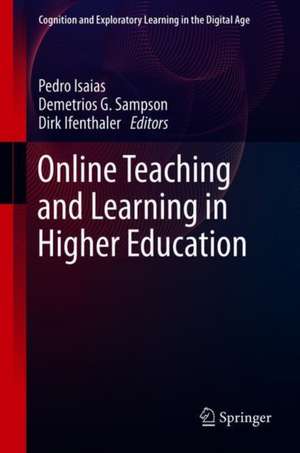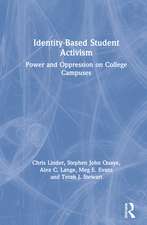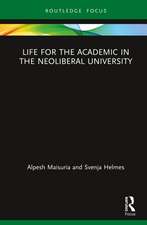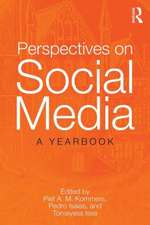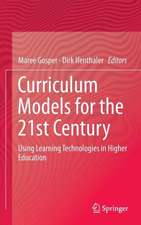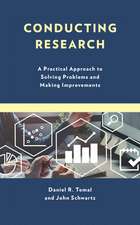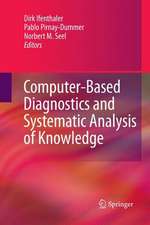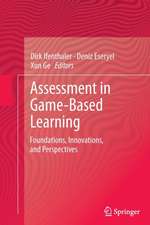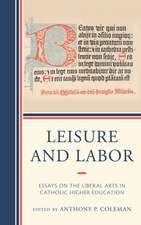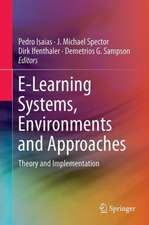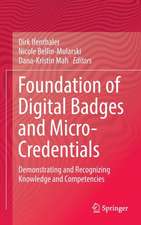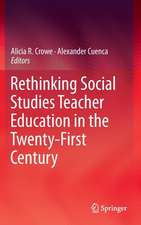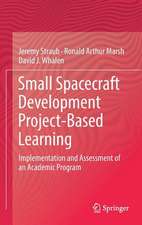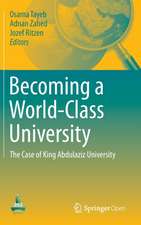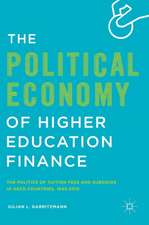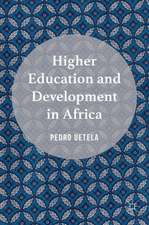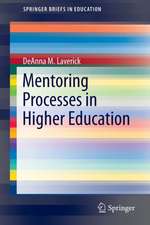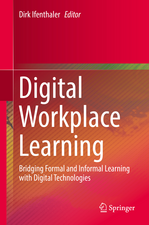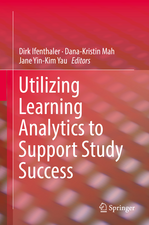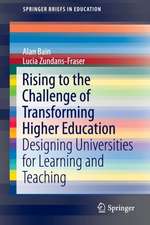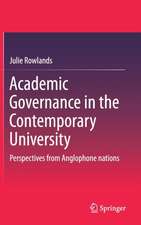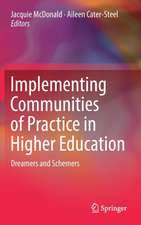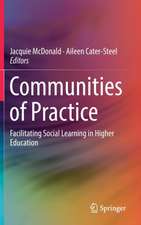Online Teaching and Learning in Higher Education: Cognition and Exploratory Learning in the Digital Age
Editat de Pedro Isaias, Demetrios G. Sampson, Dirk Ifenthaleren Limba Engleză Hardback – 30 sep 2020
The variety of settings portrayed in this volume attest to the unlimited opportunities afforded by online learning and serve as valuable evidence of its benefit for students’ educational experience. Moreover, these research efforts assist a more comprehensive reflection about the delivery of higher education in the context of online settings.
| Toate formatele și edițiile | Preț | Express |
|---|---|---|
| Paperback (1) | 693.90 lei 43-57 zile | |
| Springer International Publishing – oct 2021 | 693.90 lei 43-57 zile | |
| Hardback (1) | 947.67 lei 43-57 zile | |
| Springer International Publishing – 30 sep 2020 | 947.67 lei 43-57 zile |
Preț: 947.67 lei
Preț vechi: 1155.69 lei
-18% Nou
Puncte Express: 1422
Preț estimativ în valută:
181.34€ • 189.81$ • 150.93£
181.34€ • 189.81$ • 150.93£
Carte tipărită la comandă
Livrare economică 31 martie-14 aprilie
Preluare comenzi: 021 569.72.76
Specificații
ISBN-13: 9783030481896
ISBN-10: 3030481891
Ilustrații: XXIV, 211 p. 57 illus., 40 illus. in color.
Dimensiuni: 155 x 235 mm
Greutate: 0.51 kg
Ediția:1st ed. 2020
Editura: Springer International Publishing
Colecția Springer
Seria Cognition and Exploratory Learning in the Digital Age
Locul publicării:Cham, Switzerland
ISBN-10: 3030481891
Ilustrații: XXIV, 211 p. 57 illus., 40 illus. in color.
Dimensiuni: 155 x 235 mm
Greutate: 0.51 kg
Ediția:1st ed. 2020
Editura: Springer International Publishing
Colecția Springer
Seria Cognition and Exploratory Learning in the Digital Age
Locul publicării:Cham, Switzerland
Cuprins
Part I: Online Higher Education.- Digital competence model of distance learning students.- Relationship between goal orientation, conception of learning and learning behaviour.- Proposing and evaluating a model of co-construction of the learning scenario by the learner.- Flipping your classroom: a methodology for successful flipped classrooms.- Part II: Online STEM Higher Education.- Implementation of an adaptive instructional design for a physics module in a learning management system.- OCRA, a mobile learning prototype for understanding chemistry concepts.- Study on the factors contributing to the motivation of mathematical studies at the university.- Self-organizing map analysis of educational skills using questionnaire to university students in computing classes.- Gamesonomy vs scratch: two different ways to introduce programming.- Building collaborative creativity through an iterative approach.- Part III: Learning Analytics in Online Higher Education.- Attributes of engagement in challenge-based digital learning environments.- Analysing university student academic performance at the unit level.- Online learners’ readiness and learning interactions: a sequential analysis.- BR-Map: concept map system using e-book logs.- Suitable judgement assistance of visualization method for sensor log overlapping on daily video.- Part IV: Case Studies of Online Higher Education.- How to flip a classroom and improve student learning and engagement: the case of PSYC1030.- The communication preferences of collegiate students.- Problem-based learning and computer-based scaffolds in distance education.- Effects of content and language integrated learning class design based on the first principle of instruction theory: a case study.- Usability evaluation of a virtual learning environment: a university case study.- Comparison of developed in “efficiensea2” project platform “balticweb” with standard ECDIS (F142).- Autodidact: Introducing the concept of mutual learning into a smart factory industry 4.0.- Concluding Remarks.- Concluding chapter by editors.
Textul de pe ultima copertă
This book is to explores a variety of facets of online learning environments to understand how learning occurs and succeeds in digital contexts and what teaching strategies and technologies are most suited to this format. Business, health, government and education are some of the core sectors of society which have been experiencing deep transformations due to a generalized digitalization. While these changes are not novel, the swift progress of technology and the rising complexity of digital environments place a focus on the need for further research and novel strategies. In the context of education, the promise of increased flexibility and broader access to educational resources is impelling much of higher education’s course offerings to online environments. The 21st century learner requires an education that can be pursued anytime and anywhere and that is more aligned with the demands of a digital society. Online education not only assists students to success-fully integrate a workforce that is increasingly digital, but it helps them to become more comfortable with the use of technology in general and, hence, more prepared to be prolific digital citizens.
The variety of settings portrayed in this volume attest to the unlimited opportunities afforded by online learning and serve as valuable evidence of its benefit for students’ educational experience. Moreover, these research efforts assist a more comprehensive reflection about the delivery of higher education in the context of online settings.
The variety of settings portrayed in this volume attest to the unlimited opportunities afforded by online learning and serve as valuable evidence of its benefit for students’ educational experience. Moreover, these research efforts assist a more comprehensive reflection about the delivery of higher education in the context of online settings.
Caracteristici
Offers a comprehensive and multi-disciplinary depiction of current issues Includes a range of case studies covering a variety of aspects of online learning Focuses on both the technological and pedagogical aspects of learning in the digital age
